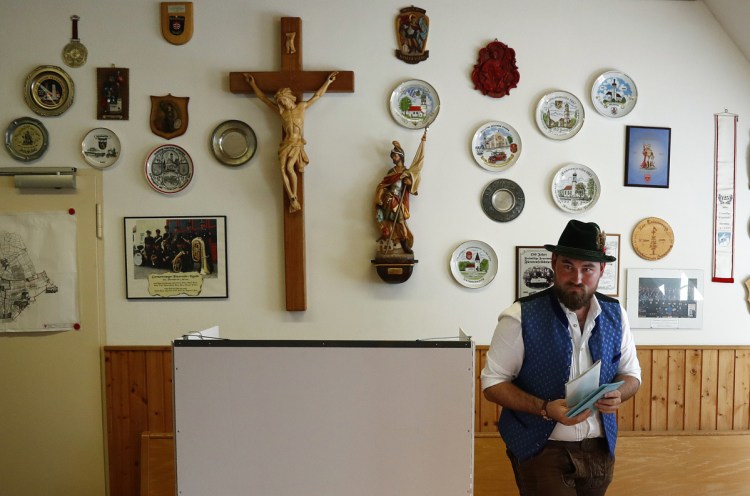BERLIN — Voters in the southern German heartland of Bavaria dealt a stinging blow Sunday to Chancellor Angela Merkel’s conservative allies, humbling a party that has governed for decades while boosting either political flank in an election defined by polarized opinions about immigration.
The dramatic loss of support for the Christian Social Union, sister party to Merkel’s own, scrambled politics in a region that has been one of the most politically stable in Europe.
Votes for the Bavarian state parliament have rarely been competitive in modern lifetimes, with the CSU crafting a “laptops to lederhosen” approach that coupled its support for high-tech industry with its embrace of traditional culture. For decades, the CSU came as close as Western Europe gets to a state party.
That changed Sunday, with voters in the affluent region defecting en masse and redistributing their support to both ends of the political spectrum. The result won’t end the CSU’s 61-year streak in power, but it will force it to bargain for partners.
And it will almost certainly add to the strain on an already beleaguered Merkel, whose other coalition partner, the center-left Social Democrats, or SPD, was also punished Sunday. The combined share of the vote won by the SPD and CSU was down more than 20 percent since the last election, in 2013.
“It’s an earthquake,” said Thomas Kleine-Brockhoff, who leads the German Marshall Fund’s office in Berlin. “People are dissatisfied with this so-called grand coalition. This is not the way they want things.”
Projected results showed the CSU falling from nearly half the vote five years ago to 37 percent. The Green Party surged to second place, with 18 percent, and the far-right Alternative for Germany is set to enter the Bavarian parliament for the first time, with nearly 11 percent.
The projected results sent a stream of green confetti raining down on jubilant Greens activists at the party’s election night headquarters. There was a similarly exuberant celebration among dirndl- and lederhosen-clad AfD supporters.
It was a different story for the CSU, with stern-faced Bavarian state premier Markus Söder telling a quiet gathering of the party faithful that the result “isn’t easy.”
“We will accept it with humility. We will need to learn from it. We will need to analyze it precisely,” he said.
Söder tried to put a brave face on the outcome, insisting that the CSU will continue to lead the state’s government, despite a result that is the second-worst in the party’s history. The CSU, he said, “isn’t only the strongest party, but it received a clear mandate to govern.”
The CSU has ruled out a coalition with Alternative for Germany, but could strike a deal to govern with one or more smaller conservative parties, or perhaps even with the Greens.
The election was closely watched in Germany, and the results appear to fit a pattern seen both within the country and across the continent. Traditional centrist parties that once flirted with absolute majorities of the vote are withering. Niche and politically extreme parties are gaining as the electorate fragments into ever finer shards.
At the national level, that has meant a record seven parties in the parliament since elections last year, and a deeply dysfunctional governing coalition of three.
The Bavarian result, said Kleine-Brockhoff, confirms long-known struggles for Europe’s center-left. But it also points to the difficulties ahead for the continent’s center-right. “We’re looking at the slow fragmentation of Christian conservatism,” he said.
Sunday’s result is likely to reverberate loudly in Berlin, where it will be seen as yet another blow to Merkel’s once-mighty fusion of her Christian Democratic Union with its Bavarian sister.
Send questions/comments to the editors.



Success. Please wait for the page to reload. If the page does not reload within 5 seconds, please refresh the page.
Enter your email and password to access comments.
Hi, to comment on stories you must . This profile is in addition to your subscription and website login.
Already have a commenting profile? .
Invalid username/password.
Please check your email to confirm and complete your registration.
Only subscribers are eligible to post comments. Please subscribe or login first for digital access. Here’s why.
Use the form below to reset your password. When you've submitted your account email, we will send an email with a reset code.